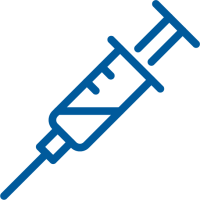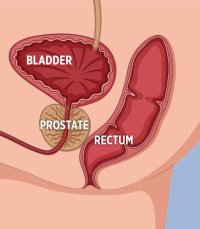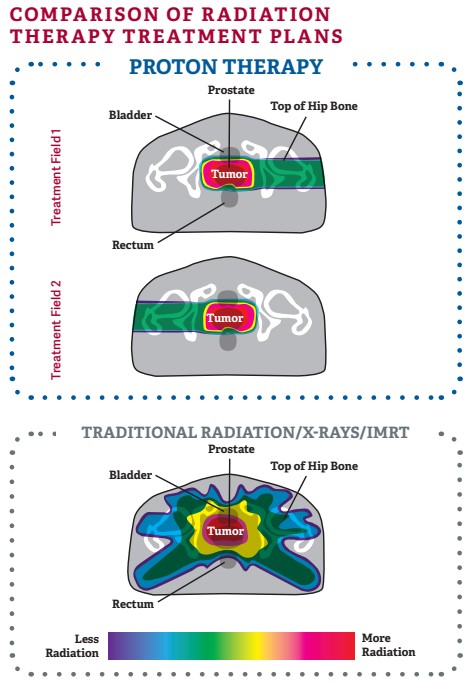Proton therapy for prostate cancer
- Maintains quality of life
- Lower risk of side effects
- Reduced impact on bodily functions
- Reduced radiation exposure
- Controlled placement & dosage
- Treatment of complex tumors
- Treatment near sensitive organs
Precise Cancer Treatment
Cancer Treatment that allows patients to maintain their quality of life by reducing risks of side effects.
Proton therapy is an advanced form of radiation therapy that precisely treats the tumor using proton particles instead of x-rays. Protons do not deposit radiation beyond the tumor they are targeting, causing less damage to healthy tissue. Reducing unnecessary radiation results in fewer treatment-related side effects.
A care coordinator will contact you by phone during normal business hours.
Proton Therapy for Prostate Cancer Form
Precise Cancer Treatment
Cancer Treatment that allows patients to maintain their quality of life by reducing risks of side effects.
Proton therapy is an advanced form of radiation therapy that precisely treats the tumor using proton particles instead of x-rays. Protons do not deposit radiation beyond the tumor they are targeting, causing less damage to healthy tissue. Reducing unnecessary radiation results in fewer treatment-related side effects.
A care coordinator will contact you by phone during normal business hours.
Proton Therapy for Prostate Cancer Form

Effective treatment for Prostate Cancer
Prostate cancer can be treated with a variety of methods, including surgery, brachytherapy, traditional radiation therapy, and proton therapy. It’s important to consult with your provider to determine the best treatment plan for you. Proton therpay is particularly beneficial for prostate cancer patients because it is non-invasive and minimizes side effects.

Precise treatment with fewer side effects
Proton therapy, an advanced form of radiation therapy, uses proton particles rather than x-rays to treat cancer. Using pencil-beam technology, proton therapy can precisely target radiation to kill cancer within the prostate while protecting the surrounding tissue. This precision results in decreased risk for treatment-related side effects, including bladder and bowel complications.

Maintain quality of life during & after treatment
Because proton therapy reduces treatment-related side effects, most patients are able to maintain their levels of pre-treatment activity throughout treatment.

- 5% higher 5-year overall survival in intermediate risk
- Patients who received proton therapy report highest quality of life
compared to surgery, x-ray, or brachytherapy patients - 35% less radiation to the bladder
- 59% less radiation to the
rectum - 42% reduction in relative risk of developing a secondary
malignancy - Fewer gastrointestinal, genitourinary, endocrine and other complications
- 50% reduction in treatment related bowel frequency and
urgency at 2 years - 21% lower risk of urinary toxicity at 2 years
- 25% lower risk of erectile dysfunction at 2 years
- 21% lower risk of urinary toxicity at 2 years
- 25% lower risk of erectile dysfunction at 2 years
What is the Best Treatment for Prostate Cancer?
There are several effective treatment options for prostate cancer, all of which have advantages and disadvantages. A patient needs to explore his options and discuss the specifics of his case with physicians experienced in all treatment options to discover a personalized, best treatment plan. Depending on the stage, most patients with prostate cancer have a very good chance of being cured with surgery, proton therapy, seed implants (brachytherapy), regular x-ray therapy or focused ablation.

What is proton therapy?
Proton therapy uses charged particles (protons) rather than x-rays to selectively destroy cancer cells. This results in excellent rates of cancer control with a much lower risk of side effects compared with other forms of radiation therapy.
What makes proton therapy different?
Proton therapy is a highly advanced and extremely precise form of radiation. The physical properties of protons, described by the Bragg-Peak (Figure 1 down below on page), and the increased conformality of pencil beam scanning make it possible to spare healthy surrounding organs from unnecessary radiation exposure during treatment
Why is this important?
Traditionally, adverse events caused by exposure of healthy surrounding organs to the radiation field has been a concern. When treating prostate cancer with proton therapy, the rectum and bladder which are near the prostate, are exposed to much less radiation. Therefore, men treated with proton therapy have a very low risk of short or long-term side effects such as bowel problems or urinary incontinence.
Is proton therapy effective?
Yes! Many clinical studies have demonstrated the effectiveness of proton therapy for treating prostate cancer.

Proton therapy offers very high survival rates with great quality of life
Proton therapy Cancer-Free Rates at 5 Years
| Study/Year Published | Low Risk | Intermediate Risk | High Risk |
|---|---|---|---|
| 2016 University of Florida Study | 99% | 94% | 74% |
| 2017 Northwestern University – Medicare SEER Database Study | – | 93.7% | – |
| 2018 Japanese Radiation Oncology Study Group – Multi-institutional Study | 97% | 91.1% | 83.1% |
Less radiation, better quality of life
Proton therapy deposits less radiation dose before reaching the tumor, then deposits the prescribed dose within the tumor, and has no exit dose.
X-ray radiation must start with a higher dose that gradually declines to the prescription dose at the tumor, then continues to deposit radiation in healthy surrounding tissue as it exits the body.

Hear from some of our prostate cancer survivors
Patient Stories

James Cook, Patient
“The doctors at the seminar were amazing. They told me not to worry, and they would take care of this.” “Everyone was so friendly and welcoming. I appreciated that, because I was at a low point.”

Kevin Murphy, Patient
"The urologist explained my options, which were surgical removal of the prostate, conventional radiation, proton therapy, or do nothing, which they call “watch and wait.” I didn’t want to not do anything, so I pursued the proton therapy options."

Mike Dresel, Patient
"Proton therapy sounded like it was the easiest thing to tolerate with the least amount of side effects. I looked into several clinics. We chose Thompson Proton Center because they came recommended to us and it was somewhat close to home. Also, they immediately followed up with me, and that made the difference."
Committed to our cause since 1985
The Thompson Cancer Survival Center Story
World-Class treatment, right in Knoxville, TN
Thompson Proton Center is one of less than 50 proton centers in the entire world. And, we’re proud to be members of Thompson Cancer Survival Center, where leading cancer specialists use the most advanced technologies and treatment methods to achieve breakthrough successes. Our network of cancer care providers are supported by a team of patient navigators, oncology pharmacists, dietitians, genetics counselors, clinical trials experts, physicists, therapists, technologists, and nurses with one goal: to treat and beat your cancer.
Our leading oncologists
You’re in good hands with Thompson Proton Center

Radiation Oncologist
and Medical Director
Ryan Grover, MD
Residency:
Radiation Oncology
Loma Linda University Medical Center
Medical School:
University of Southern California

Radiation Oncologist
Brion Shin, MD
Residency:
Radiation Oncology
Loma Linda University Medical Center
Medical School:
Loma Linda University Medical Center

Radiation Oncologist
Allen Meek, MD
Residency:
Radiation Oncology
Johns Hopkins University
Medical School:
Johns Hopkins University
- Fill in our quick form
- A care coordinator will contact you by phone during normal business hours.
- We’ll take the time to listen and plan the next steps
A care coordinator will contact you by phone during normal business hours.

